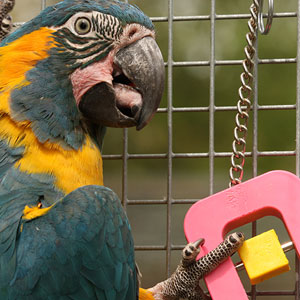
My First Bird
What Will My New Bird Need?
You have done your research and understand the commitment a pet bird requires. You have looked into the different types of birds and decided (or at least narrowed down) your list of what species of feathered friend you will soon be adding to your family. Now it's time to make a shopping list of all the pet bird supplies your new bird will need so you can have everything in place and ready to go when your newest feathered family member arrives.To help you get started, we've put together a list of the basic birdie must-haves:
Food
Just like every living creature, proper nutrition is key to your bird's health. With a few special exceptions, seeds and nuts should not be a regular part of a pet bird's diet, but reserved as treats. Seed diets provide an alternative to pelleted/extruded diets and gives him the chance to forage. But a seed diet should be given in moderation.A formulated extruded or pellet diet made especially for your species of bird is a great way to ensure your feathered friend is getting the dietary requirements they need. Selecting pellets as a base diet and adding fresh or dehydrated fruits and veggies is a great place to start. Other dietary additions include nuts, beans and cooked brown rice. To change things up once in a while, consider adding in a cooked food.
One thing you need to watch out for with birds (or any pet for that matter) is toxic foods that could be harmful. Things like onions, avocado or chocolate may sound good to you, but they are toxic to your bird. And if you aren't sure if a food is toxic for your bird, it's always best to err on the side of caution and avoid it.
Water and Food Bowls
Bowls with wide, rather than deep cups will encourage your bird to try new food items. It is recommended to have two sets of dishes so one set can be cleaned while the other is being used. Many food and water dishes have a built in perch, and they all have a ledge the bird can balance on as he eats and drinks. To eliminate the struggle of soggy food floating around in the water dish, consider buying a waterer that is designed to keep food out of the water. Also, try this tip: place the food bowl at the opposite end of the cage from the water bowl. This will ensure that the bird gets some exercise between eating and drinking.Cage
The biggest cage you can afford and that will fit in your home is ideal. A basic rule of thumb to follow when it comes to cage size; find a cage that is wide enough so your bird can fully extend her wings and high enough to accommodate birds with long tails. Also, make sure the cage is made of a strong, non-toxic material and is easy to clean.Cage Liners
Cage liner paper, paper towels, or newspapers will serve this purpose just fine. An advantage of choosing a paper cage liner over sand or wood chips is paper is easier to monitor and clean when your bird does his "business" (something your feathered friend will do quite often). It's recommended to put the liner under the mesh barrier to maintain space between your bird and his droppings.Cleaning Supplies
It's recommended to give your bird's cage a weekly thorough cleaning. But don't use just any cleaning products. Birds are sensitive and certain cleaning products can be harmful. Bird-safe cleaning supplies such as Pet Focus Aviary and Cage Cleaner and Poop-off® Bird Poop Remover work well to clean cages and are safe to use around your feathered family member.Perch
If you are handy or crafty you can make your bird's own perch or you can buy a couple perches for your bird. Perches do more than just serve as a place for your bird to stand. A variety of perch textures allows your bird to keep her nails trimmed and ensures her foot muscles stay strong and healthy. It's important to provide at least two different perches in a cage so your feathered friend's feet don't get deformed. A perch should allow maximum horizontal flight, be sized appropriately for the bird's feet, and provide good footing.Make sure perches are set far enough from the food and water bowls and if you are making your own perch, make sure the branches are from pesticide-free, non-toxic trees such as Northern hardwoods, citrus, eucalyptus, or Australian pine.
A Place to Hide
Most birds are quite social, but they also appreciate a place where they can go for a bit of privacy. A towel, paper bag, or nest box can work well for this purpose.Toys
Birds LOVE toys. And birds NEED toys. Chewing is essential to your pet bird's physical and mental well-being. Chewing on toys helps maintain your bird's beak. A parrot that doesn't have items to chew on may end up with an overgrown beak and other health issues. Soft white pine, cuttlebone, rawhide and leather chews, or pine cones help to keep the beak healthy and will keep your bird active. In addition, interactive and foraging toys are crucial for your bird's mental health. They prevent boredom and provide hours of entertainment. Keep in mind toys made of balsa wood, cedar, redwood, and pressure-treated pine are all no-nos.Visual and Audio Stimulation
Print pictures of other birds of the same species as yours. Hang those pictures near their cage or play gym. But make sure your bird has a safe alone-space they can go to if they feel threatened by the picture of another bird. Offering mirrors is another way to provide visual stimulation. Occasionally moving your bird's perch or cage also helps create a different view for your feathered friend. When it comes to audio enrichment, occasionally playing audio clips of parrots in the wild or simple natural sounds can help to calm your bird. Silence or unfamiliar sounds can be stressful. Avian Pet Tunes is preloaded with scientifically proven sounds and music designed just for reducing bird anxiety.First Aid
Chances are at some point in your bird's life, there will be at least a little blood. Kwik Stop Styptic Powder puts a quick stop to bleeding following wing clipping, nail clipping and other minor cuts.You
The most important thing your bird needs is you. Birds are flock animals. By placing a pet bird in your home, you have now become their flock. Therefore, spending time playing with your pet bird is crucial. No enrichment toy can replace the benefit of interacting with a member of their flock.So now that you know the birdie supplies you'll need, it's time to now take a closer look at the birdie gear we get the most questions about - cages.
Sources
Pet MDAssociation of Avian Veterinarians
Return to Bird Articles


